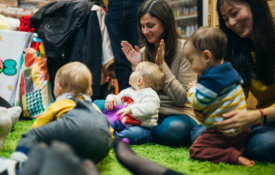-

Parents Fine-Tune Their Speech to Children’s Vocabulary Knowledge
Researchers have developed a method to experimentally evaluate how parents use what they know about their children’s language when they talk to them.
-
Did a Cuttlefish Write This?
Captive cuttlefish require entertainment when they eat. Dinner and a show — if they can’t get live prey, then they need some dancing from a dead shrimp on a stick in their tank. When the food looks alive, the little cephalopods, which look like iridescent footballs with eight short arms and two tentacles, are more likely to eat it. Because a person standing before them has to jiggle it, the animals start to recognize that mealtime and a looming human-shaped outline go together. As soon as a person walks into the room, “they all swim to the front of the tank saying, give me food!” said Trevor Wardill, a biologist at the University of Minnesota who studies cuttlefish vision.
-
How Our Emotional Lives Improve with Age
When we are young, our skills tend to improve with age and experience. But once we are well into adulthood, it may start to feel as if it’s all downhill. With every advancing year, we become slightly more forgetful, somewhat slower to respond, a little less energetic. Yet there is at least one important exception: In the emotional realm, older people rule supreme.
-
Perfectionism Can Become a Vicious Cycle in Families
Roshni Ray Ricchetti was 16 years old when she arrived at MIT with perfect SAT scores and “lots and lots” of AP credits. She said her parents pushed her to make the absolute most of her talents. “I was a very, very high-performing student who, frankly, crashed and burned. I dropped out of MIT. And I’ve ended up okay in spite of that,” the Illinois-based science editor told me. But while she says she doesn’t want to expect too much of her own three children, Ricchetti worries that her daughter might not be “exceptional” at anything. “It drives me nuts that she’s not two full years ahead in Khan Academy, which I make my kids do on the side,” she said.
-
Quality Shines When Scientists Use Publishing Tactic Known as Registered Reports, Study Finds
In 2013, the journals Cortex, Social Psychology, and Perspectives on Psychological Science launched a groundbreaking publishing format—called a registered report—that they hoped would solve several problems worsened by conventional publishing practices. One issue was that many journals declined to publish important negative results, judging them not sufficiently novel. In addition, many authors analyzed their data in multiple ways but only reported the most interesting results. The trio of journals thought registered reports offered a better way.
-
Why Facebook Really, Really Doesn’t Want to Discourage Extremism
Last year, the Wall Street Journal reported Facebook executives allegedly shut down internal research showing the platform increased political polarization and declined to make changes that might make the platform less divisive. Why might Facebook be reluctant to reduce polarization on its platform? Our study, recently published in the Proceedings of the National Academy of Sciences, might offer an answer. Polarizing posts are more likely to go viral We analyzed nearly 3 million U.S.-based tweets and Facebook posts to examine what social media posts that go “viral” have in common.

